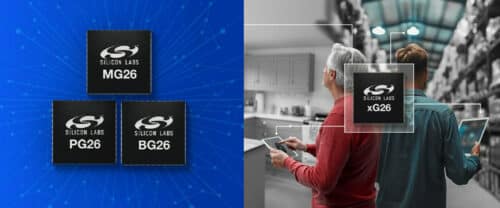The Cortex-M33 SoCs and MCUs offer increased flash and RAM, more GPIO pins, and AI/ML acceleration for wireless applications.

Silicon Labs has introduced the xG26 family of Cortex-M33 wireless SoCs and MCUs, including the multiprotocol MG26 SoC, the Bluetooth LE BG26 SoC, and the non-wireless PG26 general-purpose MCU. This new family boasts double the flash and RAM of the previous xG24 devices, along with twice the number of general-purpose input/output (GPIO) pins, enabling the creation of more complex devices. The larger memory capacity, up to 3200 KB and 512 KB respectively, is further enhanced by the integration of a Matrix Vector Processor (MVP) for AI/ML hardware acceleration and advanced mathematical functions.
The xG26 family is suitable for a wide range of users, from device manufacturers in the IoT, smart home, and wearable technology sectors to engineers and developers working on complex devices. It is also ideal for AI and machine learning practitioners, industrial automation, and automotive electronics, thanks to its robust processing and wireless capabilities. The microcontrollers cater to various applications, including Home Automation, Home Security, smart appliances, entertainment devices, wearables, Smart Cities, Industrial IoT, Smart Buildings, and Retail.
The MG26 SoC is particularly suitable for Matter over Thread applications, enhancing interoperability among different IoT networks and ecosystems. The BG26 is tailored for devices utilizing Bluetooth LE and Mesh technology, while the PG26 is perfect for powering unconnected applications like CCTV cameras, remote controls, and children’s toys.
While there is currently no information available regarding development boards for the BG26 and MG26 MCUs, it has been confirmed that some parts (QFN48) are pin-to-pin compatible with their xG24 counterparts. Additionally, the new Cortex-M33 microcontrollers can be programmed using Simplicity Studio 5. Machine Learning capabilities will be supported through Silicon Labs’ Machine Learning Toolkit, which includes tools for developers such as TensorFlow Lite, Edge Impulse, and SensiML. Moreover, ML libraries provided by Sensory (for wake word and voice command recognition) and Micro.ai (for anomaly detection) will be made available to enhance the functionality of these microcontrollers.
For more information, click here.






